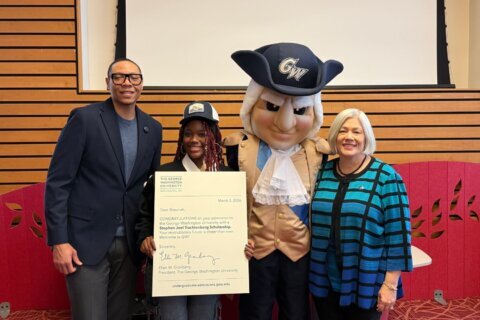The day after a draft Supreme Court opinion that would overturn the 1973 Roe v. Wade decision legalizing abortion in the U.S. was leaked, D.C. leaders gathered at Planned Parenthood in Northeast.
They reaffirmed their support for reproductive choice, called on Congress to pass a law affirming Roe’s protections, and pointed out the unique position of the District’s 750,000 residents who lack congressional representation.
“We are at special peril,” said Del. Eleanor Holmes Norton, D.C.’s nonvoting representative in the House.
The revocation of Roe would, at least initially, leave the question of abortion up to individual states. And because D.C. isn’t a state, any law passed codifying the protections of Roe v. Wade into law would be subject, as all D.C. laws are, to review by Congress.
Most forecasters are saying the Republicans, who have made no secret of their opposition to abortion rights for decades, are likely to take over the House after November’s elections.
“The Republican Congress is likely to use this decision to try to ban abortion in D.C. in particular,” Norton said. “Until the District gets statehood, we cannot make that decision for ourselves.”
If the GOP does take over the House, Norton said she would “fight in the Senate, where I usually have greater luck, even though I’m not a member of the Senate, in keeping Republicans from doing all they can to harm the District.”
“If this is the decision, I’m ready to fight,” she added.
D.C. Mayor Muriel Bowser recalled House Republicans’ yearslong ban on needle exchanges in the District, and the fact that drug-related HIV cases plummeted when Democrats took over the House and lifted the ban.
“We have seen before what happens when Congress intervenes in our ability to provide health care,” Bowser said. “That tells us what we already know — the government shouldn’t be in the business of blocking access to health care.”
The mayor added: “We cannot leave our children, our girls, a less free society than the one we were born into. … We cannot build a society where our girls look to other, freer nations, and wonder why they can’t have the same rights.”
She called for D.C. statehood, and said, “I also want to state this clearly — that Washington, D.C., is a pro-choice city. Last night’s news didn’t change that. Women still have access to care in D.C. We are ready to stand shoulder-to-shoulder with the hundreds of millions of Americans who share this value and share it deeply and are willing to fight for it and willing to protect it.”
‘They don’t care’
Several members of the D.C. Council also spoke at the news conference, including Council Chair Phil Mendelson. “I am confident that the Council is unanimous, that the government is unanimous, in our view towards what the Supreme Court might do,” he said.
Council Member Charles Allen, of Ward 6, referred to the Supreme Court justices and to voting members of the House, saying: “We didn’t even get to vote on the people that are sitting there, that are gonna make these decisions. … When they say ‘Let it rest with the states,’ people who will never show up on your ballot will make the decisions for us.”
Brianne Nadeau, the council member for Ward 1, said reproductive rights was the issue that got her involved in politics in the first place, taking part in the March for Women’s Lives in 2004. “When you’re young and you’re an activist,” Nadeau said, “if you’re lucky, the women that came before you don’t warn you that you might still be doing this work 20 years later, because you might lose hope.”
She called the justices who signed on to overturn Roe “part of the Republican machine that has taken over our country, that we are fighting back every day. These are the same people who don’t care about getting guns off the street,” Nadeau said.
“These are the same people that don’t care about women’s health. These are the same people that don’t care about mental health. And they don’t care about the major issues that we take on every day in the District of Columbia uphill with both hands tied behind our back, because we don’t have the representation in Congress that we deserve.”
Council member Robert White said of the opinion: “What it will not mean is the end of abortions; it will mean the end of safe abortions. That is a dangerous thing. And we can’t accept it.”
The father of two girls, White said, “I don’t want to have to explain to my daughters why they have less autonomy over their bodies than men. That is not fair. That is not freedom. That is not progress. … That is not American.”
‘Hard to hear’
Dr. Serena Floyd, the medical director at Planned Parenthood in D.C., said the draft “confirmed what many of us were anticipating, and what we have been preparing for, but it was still tremendously hard to hear.”
She added, “I know firsthand what this will mean for many patients just like the ones I take care of here in the DMV — individuals who are relying on this care to have control over the direction their lives will take, to be able to live the futures they desire and that they deserve.”
Floyd said she had recently cared for a patient who had come from Texas, where abortion has been effectively banned, and for a mother of five from Southeast D.C. who needed to take donations to be able to pay for her procedure. “I do this work for my daughters,” Floyd said, “for whom I will always fight for the right to control their own bodies.”
“This is a pivotal moment in our history,” said Laura Meyers, the president and CEO of Planned Parenthood of Washington, “and we can affect the outcome.”








